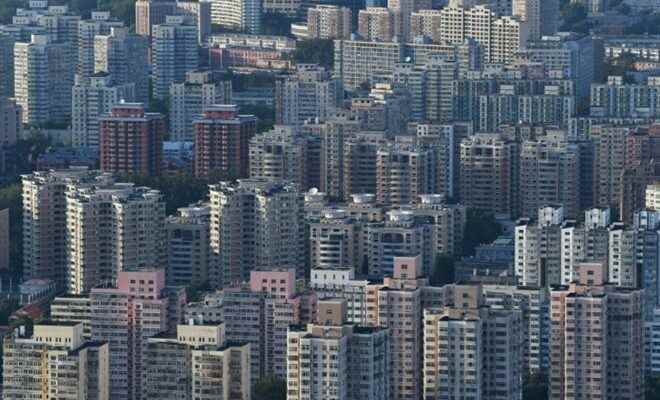A construction site of the Evergrande real estate group in Zhumadian, in the province of Henan (central China), in September 2021 (AFP/Archives/JADE GAO)
Newly married, Mr. Wang was about to move in with his pregnant wife in their new apartment. But the dream turns into a nightmare with the real estate crisis in China which prevents certain promoters from completing the work.
To buy the home three years ago, the 34-year-old future dad took out a loan equivalent to 300,000 euros. But without any progress on the site for almost a year, he took a radical decision: to stop paying the monthly installments.
Like him, buyers in dozens of cities are boycotting the refunds to put pressure on the promoters … themselves crippled with debt and short of cash.
“They told me that construction would resume soon,” said Mr. Wang, who does not wish to reveal his full name. “But in the end, no worker came.”
A resident of Beijing, he planned to move into this accommodation purchased in Wuhan, a large city in central China.

A residential complex of the Evergrande group in Beijing, in July 2022 (AFP/Archives/Noel Celis)
“It was difficult for us to afford this apartment. I put all my savings into it,” he explains. “In the end, we still have to repay two million yuan (300,000 euros) for the loan.”
China has experienced a boom in the sector since the liberalization of the real estate market in 1998.
Developers have been able to expand thanks to bank loans. But their debt has swelled so much that the authorities have decided from 2020 to put a stop to it.
This has reduced funding opportunities for real estate giants like ex-number one Evergrande, which has been struggling for months to pay off mountains of debt.
– “Impossible situation” –
The task is complicated by these boycotts of monthly payments and by the pressure coming from the government – concerned about social stability – in order to deliver the apartments as quickly as possible to the buyers.
In Wuhan, other future owners tell AFP that the delivery date of their accommodation has been postponed several times by the promoter Myhome Real Estate.
They were supposed to move in at the end of 2021 but still don’t see anything coming. The manufacturer promised this week that it hoped to complete the site by the end of 2022.

An unoccupied Evergrande group building in central Shanghai in July 2022 (AFP/Archives/Hector RETAMAL)
In China, new apartments are most often sold before they are built. So when a developer is unable to complete the work, it is the buyer who finds himself aggrieved.
This has led to a real “crisis of confidence” in the real estate market, estimates in a recent report Andrew Batson, analyst at Gavekal Dragonomics.
“I never thought it could happen,” Mr. Hu, a 25-year-old buyer from Wuhan, told AFP of his unfinished home.
He explains that his whole family paid to finance the purchase in 2018 of his three-room apartment.
“I no longer want to pay,” said Mr. Xue, another buyer. Unable to return to his accommodation, the young man of 24 years rents an apartment whose rent weighs heavily on his finances.
“It’s not disregarding the law or contracts. It’s just that this pressure puts us in an impossible situation.”
– Vicious circle –
His family brought a first payment of 800,000 yuan (116,000 euros). He also took out a loan of 600,000 yuan (87,000 euros).

Residential buildings in Beijing, September 2021 (AFP/Archives/Greg Baker)
According to several Wuhan buyers, protests by disgruntled landlords have taken place in the city.
In all, more than 300 real estate projects in about 100 cities are affected by these payment boycotts, according to a collaborative document posted online under the title “WeNeedHome”.
Many are in Zhengzhou, a major city in central China, where authorities have, however, set up a fund to help developers so they can complete the work.
According to Nomura Bank, developers in China have so far delivered only around 60% of pre-sold homes between 2013 and 2020.
The difficulties of Chinese real estate, which represents a quarter of the country’s GDP, were revealed last year when Evergrande began to struggle to repay its creditors.
Now, the loss of Chinese confidence in the sector could further aggravate the crisis, warns Tommy Wu, an analyst at Oxford Economics.
“The danger of a vicious circle developing – falling house sales and prices, growing distress among developers and deteriorating local government finances – is worrying.”
© 2022 AFP
Did you like this article ? Share it with your friends with the buttons below.




